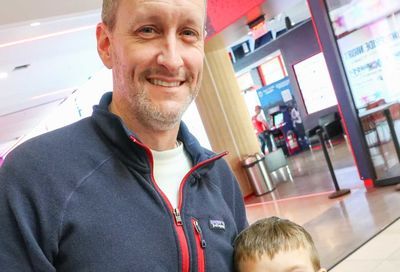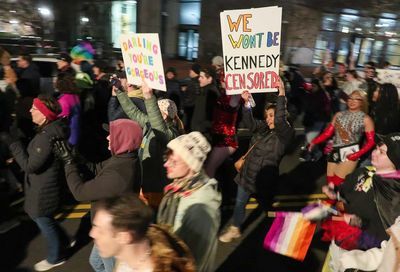Pipeline-Protest Charge Against Choi Dismissed
Activist is offered ''post and forfeit,'' dropping case against him, while DADT trial still in limbo
A D.C. Superior Court case against longtime gay rights activist Lt. Dan Choi, who made headlines for protesting the military’s now-defunct ”Don’t Ask, Don’t Tell” (DADT) policy, was dismissed Dec. 20 after the government offered Choi a post and forfeit.
Under a post and forfeit, a person arrested for certain minor offenses in the District can post collateral and then agree to forfeit it in exchange for having the case dropped.
Through his lawyer, Jon Norris, Choi, who faced a charge of failure to obey an officer and another charge of unlawful assembly and disorderly conduct, asked Superior Court Judge Juliet McKenna to dismiss the case on the basis of selective or vindictive prosecution. But even though McKenna rejected that motion, the government later offered Choi the ability to post and forfeit, thereby dropping the charges against him in exchange for $150.
In fighting the charges, which resulted from Choi’s 2011 arrest during a protest against the proposed TransCanada Keystone XL pipeline held in front of the White House, Choi repeatedly tried to subpoena more than 30 government officials, including former White House press secretary Robert Gibbs and former White House deputy chief of staff Jim Messina, to testify about their political roles in two separate protests in which Choi was arrested – one, in 2010, when Choi was protesting DADT at the White House, and the other, being the TransCanada pipeline protest.
Both times, Choi was arrested and charged with failing to obey an order given by a law enforcement officer to ”leave the sidewalk” after he refused to move from the ledge of the White House fence just above the sidewalk. But in the DADT protest, Choi was charged in the federal U.S. District, rather than D.C. Superior Court where a majority of other protesters in both instances had been charged.
Even in the pipeline protest, Choi was one of three defendants charged, but the only one to who was not at the time offered the opportunity to post and forfeit.
But Choi’s arrest in the Trans-Canada pipeline protest may have served a further purpose by bolstering his defense for his DADT-related trial, which is still mired in federal court. In the DADT case, Choi’s lawyers argued that the government had engaged in selective or vindictive prosecution of Choi by charging him separately in federal court. Choi has maintained that the Obama administration has tried to silence him because he was critical of the president’s pace in repealing DADT.
In response to the pipeline-protest post and forfeit, Choi sent an email to supporters celebrating the dismissal of the charges.
”Judge Juliet McKenna, Associate Judge of D.C. Superior Court, sternly rebuked the prosecution and the many prosecutors in the audience that such sloppy mistakes and unjust outcomes are unacceptable (Prosecutors contend it was a sloppy mistake and hide behind the different research methods they use to target certain defendants and not others).” Choi wrote in his email.
”Another interesting development: The judge did indeed find a sufficient basis to hear the testimony of the prosecutor himself, as it related to a LIMITED selective prosecution claim,” Choi wrote. ”As it was so limited, the only evidence she would hear was the prosecutor. Polished and well-rehearsed, the Assistant Attorney General Farrelly seemed to convince the judge he just screwed up. Although this limitation prevented us from diving into the true political motivations of keeping protestors away from the White House, I am happy the numerous prosecutors who rallied to support the government’s case learned that some defendants in free speech cases do not give up.”
”The prosecution wasted thousands of hours and dollars on this free speech circus,” Choi continued. ”Now the stay away restraining order is lifted. I am free to help protestors for any worthy causes make their voices heard. Today, we define justice as a verb. For in the very pursuit, there is justice.”
Choi’s federal DADT-related trial remains in limbo after being halted when Chief Judge Royce C. Lamberth, U.S. district judge for the District of Columbia, issued a writ of mandamus ordering presiding U.S. Magistrate Judge John Facciola not to allow Choi’s lawyers to argue ”vindictive prosecution” as a defense to the charge against him. Facciola had previously found there was prima facie evidence that the government had engaged in selective or vindictive prosecution.
As a result of Lamberth’s writ, when Choi’s federal trial resumes, Facciola or another presiding judge cannot take into account whether prosecutors singled out Choi for prosecution because he was openly gay, protesting the DADT policy or highly and vocally critical of the president’s administration as a possible defense.
Support Metro Weekly’s Journalism
These are challenging times for news organizations. And yet it’s crucial we stay active and provide vital resources and information to both our local readers and the world. So won’t you please take a moment and consider supporting Metro Weekly with a membership? For as little as $5 a month, you can help ensure Metro Weekly magazine and MetroWeekly.com remain free, viable resources as we provide the best, most diverse, culturally-resonant LGBTQ coverage in both the D.C. region and around the world. Memberships come with exclusive perks and discounts, your own personal digital delivery of each week’s magazine (and an archive), access to our Member's Lounge when it launches this fall, and exclusive members-only items like Metro Weekly Membership Mugs and Tote Bags! Check out all our membership levels here and please join us today!



















